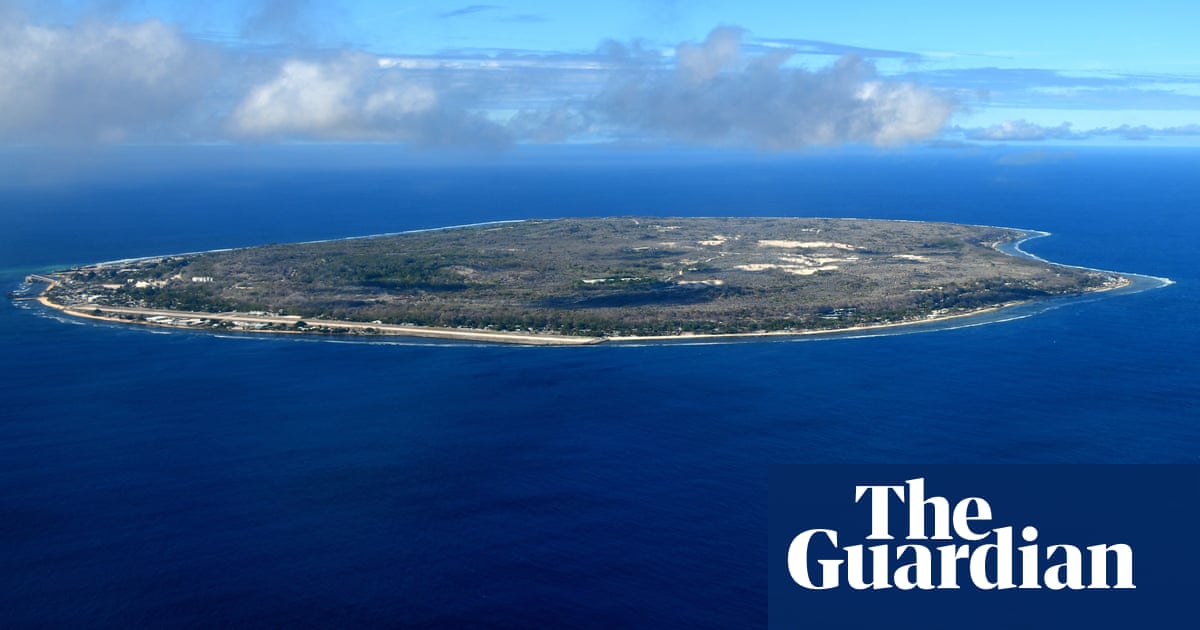Nauru has switched diplomatic recognition from Taiwan to China less than 48 hours after Taiwan’s presidential election.
In a statement, the government of the tiny island country in Micronesia, north-east of Australia, said it had decided to recognise the People’s Republic of China and was seeking the resumption of full diplomatic relations “in the best interests of the Republic and people of Nauru”.
The decision leaves Taiwan with just 12 formal diplomatic allies.
A spokesperson for China’s ministry of foreign affairs said it “welcomed” the decision and that it would mark “a new chapter in bilateral relations with Nauru on the basis of the one-China principle”.
Taiwan’s ministry of foreign affairs said it became aware of the decision on Sunday, the day after the election.
“Of course China chose this moment to have the biggest impact,” said Tien Chung-kwang, the vice-minister of foreign affairs. Taiwan’s foreign minister, Joseph Wu, who is in Guatemala, is “very upset”, said Tien at a briefing in Taipei.
Taiwan’s election returned the incumbent Democratic Progressive party, a pro-sovereignty administration that Beijing had hoped to see ousted.
During its previous two terms, China’s government had increased its pressure against Taiwan, which it claims as a province and intends to annex, despite the ruling Chinese Communist party never having governed it. Among the measures taken, which included military aggression, cognitive warfare, and economic coercion, Beijing also convinced nine of Taiwan’s diplomatic allies to switch recognition during the presidency of Tsai Ing-wen. Nauru becomes the tenth.
Tien said it was “too hypothetical” to know whether the decision would have been made in the same way and at the same time if Beijing’s preferred party, the opposition Kuomintang, had won Saturday’s election.
“No matter what the election result is, I think China is always trying to suffocate Taiwan, including in any international organisation,” he said, citing UN affiliates including the World Health Organization. “I think it’s a very good example for people around the world to see how they treat Taiwan.”
The last country to sever ties with Taiwan was Honduras in April last year, ending 82 years of mutual diplomatic recognition.
Some of Taiwan’s allies have said openly their decisions were based largely on financial incentives. Honduras’s foreign minister said at the time that it was struggling financially and Taiwan had not answered a request to renegotiate $600m in debt or increase financial aid.
Taiwan accused Honduras of asking for more than $2bn and urged it not to “quench your thirst with poison” by siding with China.
Vice-minister Tien did not answer questions about financial demands made by Nauru, but said China had a history of delivering “white elephants” to Nauru that would not deliver on their economic promises.
Nauru has switched between Beijing and Taipei several times. It had relations with Taipei from 1980 to 2002, then Beijing from 2002 to 2005, and had remained with Taipei since 2005.
In its statement on Monday. the Nauru government also said it would be adopting a one-China policy that recognised Beijing’s claim over Taiwan as an “inalienable part of China’s territory”. Many countries, including the US, recognise Beijing instead of Taipei but do not give recognition to this claim.
Nauru’s decision caught many observers by surprise. As recently as October, its previous president, Russ Joseph Kun, visited Taiwan on a state visit to meet Tsai. Kun and his wife were met with great fanfare, lauded at the coinciding Double Ten National Day.
“Nauru regards Taiwan as kin, standing firmly in our support and labouring hand-in-hand to advance democracy, freedom, peace, sustainability, stability, and economic growth in our region,” Kun said at the time.
However, just weeks after Kun’s return to Nauru he was ousted via a no-confidence motion and replaced by David Adeang. The following month, Taiwanese officials visited Nauru.
Tien said Kun had acted “inconsistently” on that visit, leading to concerns in Taipei about the stability of that relationship. Nonetheless, Nauru was among the countries that congratulated Taiwan on the successful completion of elections on Sunday, according to the ministry of foreign affairs, making the announcement all the more of a surprise. Tien said that the news was “sudden”.
Taiwan’s remaining allies are Guatemala, Belize, Haiti, Paraguay, Saint Kitts and Nevis, Saint Lucia, and Saint Vincent and the Grenadines in the Americas. In the Pacific, it is still recognised by the Marshall Islands, Palau and Tuvalu. Eswatini is its only African ally, and Vatican City the only one in Europe.
Tuvalu’s ambassador to Taiwan, Bikenibeu Paeniu, told the Guardian he was shocked to hear the decision, and that the small diplomatic corp in Taiwan was not aware it was coming.
“It’s really surprising and sad, especially to me and the people of Tuvalu,” he said. “We know what China is doing, it’s going around selling itself to countries in the Pacific.”
He said the assistance offered by China to poor countries was “not transparent” compared with Taiwan’s.
“It’s a big difference for countries like us. We are talking of climate change now and Taiwan is very serious in terms of helping us in terms of climate change. I was hoping that the four of us Pacific islands that remained would continue to be solid as a group of Pacific allies, and now we are going to lose Nauru.”







